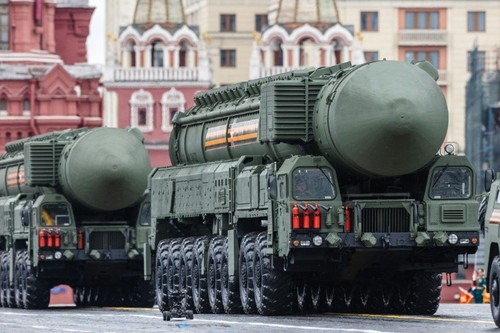 Russia's ballistic missile launcher. Photo: Getty Images Russia's ballistic missile launcher. Photo: Getty Images
|
On August 10 the Russian Foreign Ministry said it had informed the US through diplomatic channels about the decision, saying Moscow was forced to resort to this measure because Washington wants to resume inspection activities without taking into account the current reality that gives an advantage to the US.
New START negotiations make no progress
The inequality that Russia refers to is that Russian inspectors cannot fly over European territory due to the closure of air space to Russian planes. Citing exceptions stated in the Treaty, Russia claimed that Western sanctions, including visa restrictions, prevent Russian inspectors from carrying out their duties on American soil, thereby giving the US an unfair advantage. According to a statement by the Russian Foreign Ministry, inspection activities will resume when a level playing field is restored. Moscow argued that unilateral sanctions against Russia imposed by the US and its allies, including visa restrictions for Russian inspectors and a ban on any Russian aircraft in US and EU airspace, makes Russian inspections under the treaty impossible.
Earlier, Deputy Chairman of Russia’s Security Council Dmitry Medvedev expressed doubts about the US proposal to negotiate a new arms control agreement. In a statement issued on August 1, ahead of the Conference of the Parties to the Nuclear Non-Proliferation Treaty (NPT) held at UN headquarters in New York, President Biden said his administration is ready to expeditiously negotiate a new arms control framework to replace New START when it expires in 2026 but negotiation requires a willing partner operating in good faith.
Impact on global security
New START, signed by Russia and the US in 2010, has been in effect for 10 years. This is the only remaining arms control agreement between the two nuclear powers, after the US withdrew from the Intermediate-Range Nuclear Forces Treaty (INF) and the Treaty on Open Skies. New START stipulates that each country is allowed to deploy a maximum of 1,550 nuclear warheads on 700 launch vehicles. Early last year, after taking office, President Biden extended the treaty for another five years until 2026, reversing his predecessor’s policy. However, strained US-Russia relations have brought to a halt negotiations on a replacement treaty.
Russia has repeatedly warned that not replacing New START will put global security at risk, possibly triggering a new nuclear arms race. Analysts agree that the breakdown of negotiations endangers global security and the entire system of international nuclear arms treaties, including the Comprehensive Nuclear Test Ban Treaty and the Treaty on the Non-Proliferation of Nuclear Weapons.
In the Asia-Pacific region, now that China is engaging in a strategic arms race with the US, other powers like Japan, South Korea, and Australia may choose to make their own decisions on strategic security. China's strengthening of its strategic potential as bilateral relations worsen is bound to provoke a response from India. These developments could trigger a nuclear arms race. The cessation or postponement of New START would mean that a single legally binding mechanism to control US and Russian nuclear arms would disappear and the goal of nuclear disarmament would suffer a significant setback.